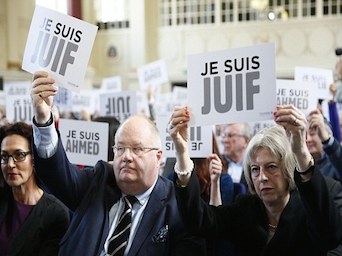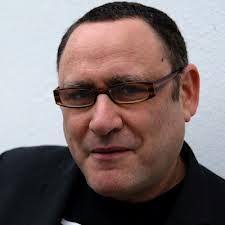By Gilad Atzmon
 The British political establishment is in a state of panic. A poll revealed last week that “a quarter of Jews in Britain have considered leaving the country in the last two years and well over half (58%) feel they have no long term future in Europe.” This could be a potential disaster for British political parties. Eighty per cent of the Tories are members of the pro Israeli lobby, The Conservative Friends Of Israel (CFI), and a similar percentage of Labour and Libdem MPs have vowed their allegiance to Israel through their respective Jewish Lobby groups. The Jews are clearly a vital source of funding for British politicians. In fact, it has become hard to imagine what British politics would look like without Jewish Lobby’s money. Though the vast majority of British MPs are friends of Tel Aviv and Jerusalem, it has not been established how many of our MPs are friendly with Manchester and Hartlepool.
The British political establishment is in a state of panic. A poll revealed last week that “a quarter of Jews in Britain have considered leaving the country in the last two years and well over half (58%) feel they have no long term future in Europe.” This could be a potential disaster for British political parties. Eighty per cent of the Tories are members of the pro Israeli lobby, The Conservative Friends Of Israel (CFI), and a similar percentage of Labour and Libdem MPs have vowed their allegiance to Israel through their respective Jewish Lobby groups. The Jews are clearly a vital source of funding for British politicians. In fact, it has become hard to imagine what British politics would look like without Jewish Lobby’s money. Though the vast majority of British MPs are friends of Tel Aviv and Jerusalem, it has not been established how many of our MPs are friendly with Manchester and Hartlepool.
Apparently a recent poll found that anti-Semitic beliefs are widely prevalent among the British public with 45 percent of Britons agreeing with at least one of these ‘anti-Semitic’ sentiments: a quarter of Britons believed “Jews chase money more than other British people,” one in six agreed that “Jews think they are better than other people” and “Jews have too much power in the media.”
However, if Jewish leaders want to focus on statistics, they surely know how to scientifically verify whether there is an element of truth in these bizarre baseless arguments that apparently 45% of Brits hold about their Jewish citizens. It would be simple to determine whether, in fact, Jews are over represented in the financial sector or in the media or politics. If Jewish leaders are concerned about the safety of their community members, it would be a good idea to examine these questions closely and think about how to address the issue. Clearly, labeling 45% of the Brits as ‘anti Semites’ is not going to make Jews feel safer in Britain.
I have lived in London, one of the most diverse cities on this planet, for about 20 years. I am surrounded by people from all over the world. Some communities occasionally prefer to voluntarily segregate themselves. Many communities are subject to harsh and manifested hatred but, somehow, it is always the Jewish community that measures statistically how unlovable the Jews are. Not the Portuguese, not the Afghans, not the Albans, not the Iranians or the Colombians. It is the Jewish leaders who choose once a month to shove in our faces the ‘numbers’ that reveal that anti Semitism is on the rise. I believe that this happens for a reason.
Jews are obsessed with measuring their unpopularity because Jews are involved collectively, and sometimes against the will of many individuals, with some very unpopular acts. The crimes committed repeatedly by the Jewish State are a problem for the Jews. The overwhelmingly forceful Jewish lobby in Britain and America is a problem that reflects badly on Jews. Even the Epstein/Dershowitz/Prince Andrew’s minor sex scandal makes Jews feel uncomfortable because Alan Dershowitz has been the prime Zionist mouthpiece for the last four decades in the USA.
I was born in Israel in the 1960’s, I am a product of a patriotic Israeli education and I am confused by all of it. In Israel in the 1970’s we were taught that Jews being despised and hated by their neighbours wasn’t something to brag about. Jews being hated filled us with shame. We believed that Jews could be reformed and become subject of admiration. We didn’t need Home Secretary Theresa May to vow to fight our haters. We believed that we could earn genuine respect through our own merits.
It took me thirty years to understand that this adventure in reform wasn’t simple at all. Israel and Zionism failed to rescue the Jew or Jewishness; quite the opposite. It took me a long time to grasp that I couldn’t become a better person unless I dropped the Jew in me and started a lifetime journey to Goy-zone. I mention my own choice because I realised that there was no collective answer to the Jewish Question. If Jews want to save their souls and their ethics, if they want to look in the mirror with pride, they must leave the collective and find their own personal way toward liberation.

Gilad Atzmon is an Israeli-born British jazz saxophonist, novelist, political activist and writer.
Atzmon’s album Exile was BBC jazz album of the year in 2003. Playing over 100 dates a year,[4] he has been called “surely the hardest-gigging man in British jazz.” His albums, of which he has recorded nine to date, often explore the music of the Middle East and political themes. He has described himself as a “devoted political artist.” He supports the Palestinian right of return and the one-state solution in the Israeli-Palestinian conflict.
His criticisms of Zionism, Jewish identity, and Judaism, as well as his controversial views on The Holocaust and Jewish history have led to allegations of antisemitism from both Zionists and anti-Zionists. A profile in The Guardian in 2009 which described Atzmon as “one of London’s finest saxophonists” stated: “It is Atzmon’s blunt anti-Zionism rather than his music that has given him an international profile, particularly in the Arab world, where his essays are widely read.”
His new book The Wandering Who? is now availble at Amazon.com
ATTENTION READERS
We See The World From All Sides and Want YOU To Be Fully InformedIn fact, intentional disinformation is a disgraceful scourge in media today. So to assuage any possible errant incorrect information posted herein, we strongly encourage you to seek corroboration from other non-VT sources before forming an educated opinion.
About VT - Policies & Disclosures - Comment Policy



